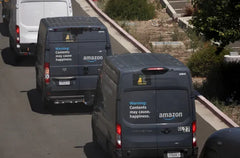
Maersk Sets Sail for U.S. Parcel Delivery Market with Strategic Upgrades
Table of Contents
- Key Highlights:
- Introduction
- Maersk E-Commerce: An Overview
- Enhancements on the Horizon
- Competing in a Crowded Market
- Leveraging End-to-End Capabilities
- Challenges and Lessons from Competitors
- Future Outlook for Maersk E-Commerce
- The Role of Technology in Delivery Services
- Sustainability in Parcel Delivery
- Conclusion
- FAQ
Key Highlights:
- Maersk is enhancing its parcel delivery service, Maersk E-Commerce, to include features such as real-time tracking and signature verification, with full availability expected by 2026.
- The shipping giant aims to capture market share from smaller parcel carriers by deploying its own delivery vehicles in areas with sufficient volume.
- Leveraging its existing multi-carrier network, Maersk offers significant advantages in reliability and coverage for clients, particularly smaller shippers.
Introduction
The parcel delivery landscape in the United States has become increasingly competitive, with established players like FedEx, UPS, and Amazon dominating the market. However, Maersk, traditionally known for its prowess in ocean shipping, is setting its sights on this lucrative segment. By implementing strategic upgrades to its Maersk E-Commerce service, the company is looking to carve out a significant share of the parcel delivery market. As the demand for efficient logistics solutions rises, Maersk's proactive steps could redefine its role in the U.S. delivery ecosystem.
Maersk E-Commerce: An Overview
Maersk E-Commerce was established as part of the company's broader strategy to diversify its services beyond maritime logistics. The service operates through a robust network of national and regional carriers, allowing Maersk to offer flexible and reliable parcel delivery solutions. This service operates on two levels: standard delivery, which typically ranges from two to five days, and expedited delivery that promises a faster turnaround.
The foundation of Maersk E-Commerce's U.S. delivery capabilities can be traced back to its acquisition of Visible Supply Chain Management in 2021. This strategic move equipped Maersk with enhanced e-commerce fulfillment capabilities, positioning the company to better compete against well-entrenched delivery giants. With a commitment to reliability, Maersk's multi-carrier approach allows it to adjust routes and carriers based on performance, ensuring optimal service levels for clients.
Enhancements on the Horizon
According to Sam Coiro, Maersk's head of global business development for e-commerce, the company is actively working on several enhancements to its parcel delivery service. Among these improvements are features that premium customers have been requesting, including:
- Picture Proof of Delivery: A service that confirms the successful delivery of packages through photographic evidence.
- Signature Upon Delivery Parameters: An added layer of security that ensures only authorized recipients receive their packages.
- Real-Time "Turn-by-Turn" Text Updates: These updates will inform customers of their delivery driver's progress in real-time, enhancing transparency and customer satisfaction.
These upgrades are scheduled to be fully accessible to customers by 2026, marking a significant step forward in Maersk's efforts to modernize its delivery services.
Competing in a Crowded Market
Maersk's ambitions to expand its presence in the U.S. parcel delivery market come at a time when competition is fierce. Smaller carriers are increasingly gaining market share, as evidenced by recent reports indicating that alternatives to FedEx and UPS are thriving. Despite the challenges posed by established players, Coiro believes that Maersk's unique offerings will enable it to successfully attract customers who are looking for more comprehensive logistics solutions.
The company's strategy involves not only enhancing existing services but also potentially deploying its own vehicles for deliveries in high-volume areas. Coiro hinted at the prospect of seeing Maersk-branded trucks making deliveries in urban centers like New York, a move that could significantly increase its visibility in the parcel space.
Leveraging End-to-End Capabilities
One of the key differentiators for Maersk in the parcel delivery market is its end-to-end supply chain capabilities. This advantage allows the company to offer logistics services that extend beyond simple parcel delivery. Coiro highlighted a recent engagement with a major subscription service that ships approximately one million boxes monthly. The provider faced challenges in moving goods from Asia to various markets, prompting discussions about how Maersk could facilitate and streamline its supply chain operations.
The ability to provide comprehensive logistics solutions positions Maersk as an attractive partner for shippers who seek reliability and cost-effectiveness across different transportation modes. The growing trend among shippers to seek partners who can deliver broader supply chain services plays into Maersk's strengths.
Challenges and Lessons from Competitors
While Maersk appears poised to make significant inroads into the U.S. parcel delivery sector, it's important to acknowledge the challenges that other companies have faced in the same space. For instance, the closure of companies like Maergo and Pandion illustrates the intense pricing competition that exists among parcel carriers. Both companies struggled to maintain profitability against heavyweights like FedEx and UPS, ultimately leading to their demise.
Coiro attributes Maersk E-Commerce's resilience to its established supply chain expertise, which provides a competitive edge over newer entrants that lack similar capabilities. This strategic positioning is critical in a market where price sensitivity is high, and service reliability is paramount.
Future Outlook for Maersk E-Commerce
As Maersk continues to enhance its parcel delivery services, the company’s future in the U.S. market looks promising. The integration of advanced features and the potential deployment of its own vehicles could redefine customer experiences and expectations. Furthermore, as e-commerce continues to thrive, the demand for reliable delivery solutions will only increase.
Maersk's commitment to innovation and customer satisfaction positions it well to navigate the complexities of the U.S. parcel delivery market. By capitalizing on its existing logistics strengths and expanding its service offerings, Maersk is not only preparing to compete but also to lead in an increasingly demanding industry.
The Role of Technology in Delivery Services
As the logistics landscape evolves, the role of technology becomes increasingly integral to enhancing delivery services. Maersk's upcoming features, such as real-time tracking and automated notifications, exemplify how technology can improve customer interactions and operational efficiency. These advancements reflect a broader trend in the logistics industry, where companies are investing in technology to streamline processes and enhance the customer experience.
With the rise of smart logistics solutions, companies are leveraging data analytics, artificial intelligence, and machine learning to optimize routing, manage inventory, and predict demand. For Maersk, embracing these technologies will be crucial as it seeks to differentiate itself in a saturated market.
Sustainability in Parcel Delivery
Sustainability is another key consideration for logistics providers today. As consumers become more environmentally conscious, companies are under pressure to adopt greener practices. Maersk has long been committed to sustainability, with initiatives aimed at reducing carbon emissions and enhancing operational efficiency.
In the parcel delivery space, this commitment could manifest in various ways, such as utilizing electric vehicles for urban deliveries or optimizing shipping routes to minimize fuel consumption. As Maersk expands its delivery network, integrating sustainable practices will not only appeal to eco-conscious consumers but also align with broader industry trends.
Conclusion
Maersk's push into the U.S. parcel delivery market represents a significant shift for the company, traditionally focused on maritime operations. With strategic enhancements planned for its Maersk E-Commerce service and a commitment to leveraging its extensive supply chain capabilities, Maersk is well-positioned to compete in this dynamic landscape. As the demand for reliable and efficient delivery solutions continues to rise, Maersk's proactive approach may very well position it as a formidable player in the U.S. parcel delivery market.
FAQ
Q: What is Maersk E-Commerce? A: Maersk E-Commerce is Maersk's parcel delivery service that leverages a network of national and regional carriers to provide reliable delivery solutions.
Q: What enhancements is Maersk planning for its parcel delivery service? A: Maersk plans to introduce features such as picture proof of delivery, signature verification, and real-time tracking updates by 2026.
Q: How does Maersk's multi-carrier network enhance its delivery capabilities? A: The multi-carrier network allows Maersk to route packages to the most reliable carriers based on performance, ensuring optimal service levels and 100% delivery coverage across the U.S.
Q: What challenges do smaller parcel carriers face in the U.S. market? A: Smaller carriers often struggle with pricing competition from established giants like FedEx and UPS, which can lead to challenges in maintaining profitability.
Q: How is technology impacting the parcel delivery industry? A: Technology is enhancing operational efficiency and customer engagement through innovations like real-time tracking, automated notifications, and data-driven logistics solutions.
E-ticaretinizi haftalık içgörülerimiz ve güncellemelerimizle güçlendirin!
Ticaret dünyasında neler olup bittiğiyle uyumlu kalın
E-posta Adresi
Sizin İçin Seçilmiş


30 June 2025 / Blog
Amazon Logistics on Track to Overtake USPS in U.S. Parcel Delivery by 2028
Daha Fazla Oku
30 June 2025 / Blog
